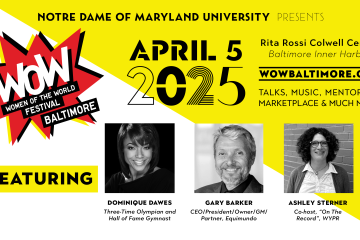Art Therapy Professor Pilots International Residency to Connect Contemporary Art Specialists and Healthcare Practitioners
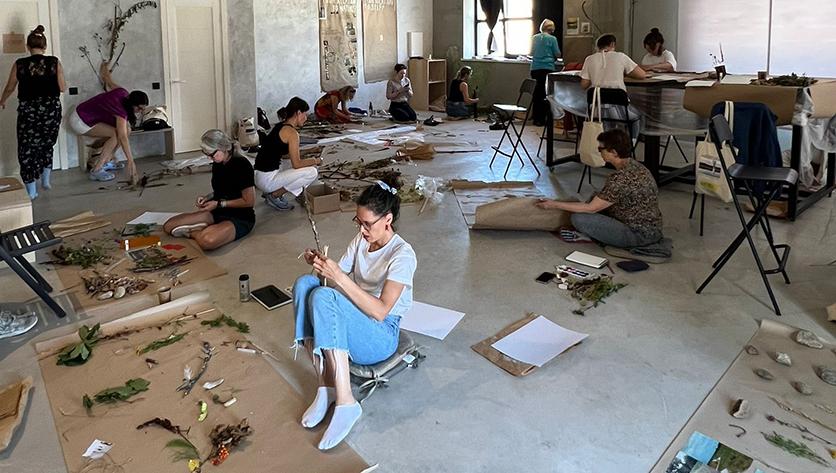
BALTIMORE – Julia Volonts originally founded Art Therapy Lab, an online platform that offers art therapy experiences to an international community, as a way to support individuals across the world whose mental health was impacted by the coronavirus pandemic.
Volonts, who joined Notre Dame of Maryland University’s Art Therapy Department as an assistant professor and graduate research coordinator in August 2024, has seen Art Therapy Lab achieve substantial growth in the two-plus years since its creation, with programming having reached individuals from more than 45 countries.
This past summer, Volonts spent time in Latvia to co-lead Art Therapy Lab’s first in-person residency program, which connected a group of artists, art educators, art therapists, and other arts-in-health professionals from seven different countries. Designed to explore concepts of nature and how contemporary art positively impacts mental and emotional well-being, the Art Therapy Lab International Residency invited participants to embark on a journey of self-exploration and community connection.
Volonts plans to continue her work with Art Therapy Lab as a faculty member at NDMU. Below, she shares insights about her initiatives and the recent pilot International Residency program.
What laid the groundwork for your ultimate decision to form Art Therapy Lab?
In 2019, I was awarded a Fulbright Scholarship to conduct art therapy research in Riga, Latvia, focusing on the use of response art to process intergenerational trauma. Six months into my research, COVID-19 started, and with it came heightened feelings of anxiety, depression, and isolation due to widespread lockdowns and socioeconomic challenges. As telehealth services became the norm, I saw an opportunity for art therapy to address these issues.
This is when I piloted my first virtual workshop series with Paris Collage Collective, which invited individuals from around the world to create artwork in response to the definition of what being alone has meant to them throughout the pandemic. Over 100 participants from across Europe, the U.S., Argentina, Hong Kong, Iran, and beyond attended. This experience inspired me to continue developing virtual art therapy initiatives and exploring how the shared experience of art-making within a safe and inclusive environment can improve mental health and well-being.
I continued to launch initiatives with Paris Collage Collective and began partnering with other art spaces, organizations, and creative practitioners. Art Therapy Lab has since adopted a hybrid model of virtual services and in-person programming, creative mentorship, and integrative arts consulting. Our mission is to connect an international community, increase accessibility to services through partnerships and collaboration, and support the next generation of art therapists and arts-in-health practitioners aspiring to practice community-based art therapy.
How many people were involved in creating this summer’s International Residency program? How did the idea originally come about?
Since returning to the U.S., I have maintained strong connections with my European colleagues. In 2023, I was approached by Latvian independent curator Maija Rudovska, who was preparing to open Studija, a new art space in Kuldiga, Latvia. She invited me to develop art therapy-focused programming that explores the intersection of contemporary art and mental health.
Over the following year, we assembled a team to develop the summer residency program aimed at examining the connections between contemporary art, eco-art therapy, and personal development. Our collaborative approach allowed us to design an immersive learning experience that encouraged participants to explore nature through the lens of contemporary art and its relationship to mental health. Maija and I served as lead organizers, working alongside Latvian performance artist Linda Bolsakova and art-based researcher Annemarie Reichenbach from Germany.
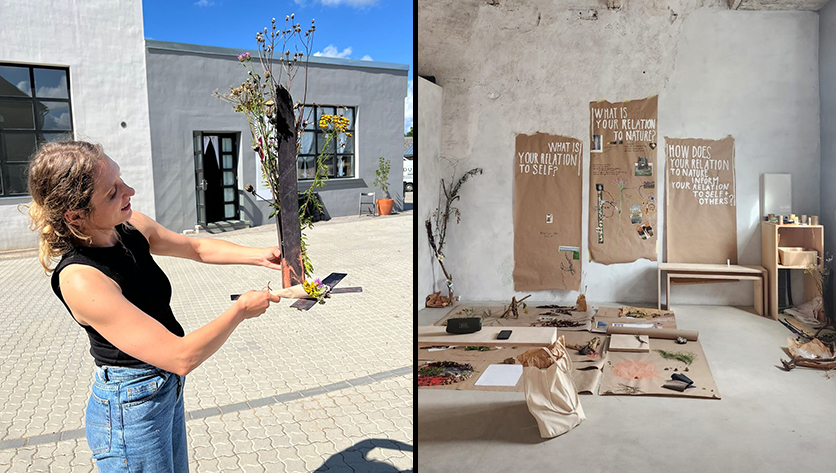
What primary objectives were you hoping to achieve through this residency?
With community-based art therapy being relatively new in Latvia, this residency was an innovative effort to demonstrate the benefits of integrating art and health sectors. Participants were expected to learn eco-therapy principles applicable to creative practices, exploring the connection between nature, art, and emotional well-being while developing skills in using natural materials in art-making. Additionally, participants reflected on their personal relationships with nature, shared professional knowledge, and deepened their understanding of art therapy.
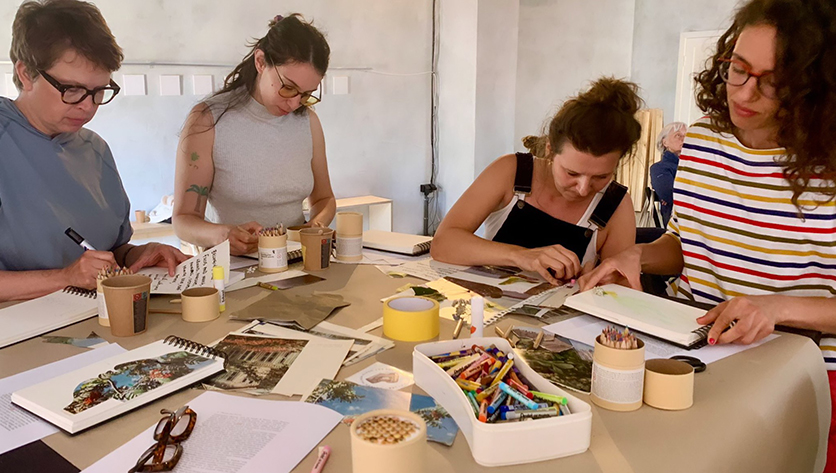
Do you believe the residency was a success? What were some key highlights from the experience?
Absolutely. The residency included art therapy experiential workshops, movement sessions, theoretical discussions, and open and closing rituals, culminating in a community exhibition during the open studio event. Participant feedback indicated a unique connection was established throughout the program.
Key highlights included the performance and movement sessions, which encouraged participants to embrace vulnerability and step outside their comfort zones. The eco-art therapy component fostered strong connections through shared in-person experiences. Interactive discussions and reflective questions enhanced self-awareness and facilitated deeper evaluations of individual processes.
Participants described the experience as “transformative, blending creative expression with personal growth,” emphasizing the unique space provided for meaningful exploration of art. Their advice for future participants is to “be open and allow yourself to express your thoughts and feelings, meet diverse individuals, and hear their experiences.”
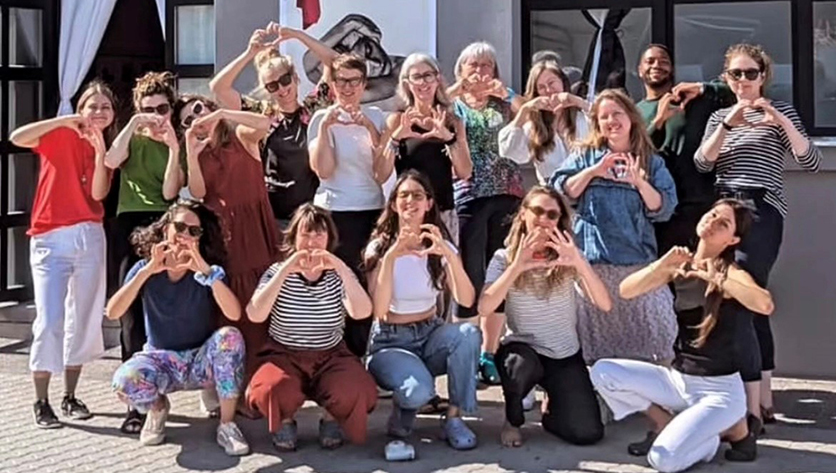
Do you hope to host another international residency next summer?
Yes, we plan to make this an ongoing project. While Maija and I, along with our researcher, will remain core organizers, we intend to invite different artists each year to lead workshops. Based on participant feedback requesting a longer residency, we are considering extending the duration and incorporating additional themes, including research and project development workshops.
Established in 1895, Notre Dame of Maryland University (NDMU) is a private, Catholic institution in Baltimore, Maryland, with the mission to educate leaders to transform the world. Notre Dame has been named one of the best "Regional Universities North" by U.S. News & World Report.




